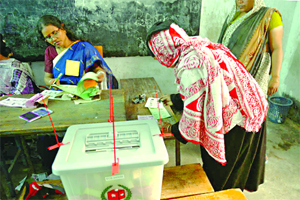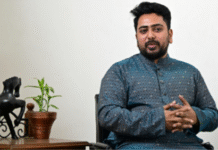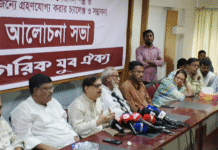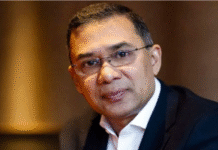Sadeq Khan
The year 2014 has been identified as “a big year of elections worldwide” in which democracy is very much under trial. Bangladesh tops the list in which democracy faltered and/or is showing all signs of faltering without redemption.
On January 6, the day after a sham general election was held in Bangladesh boycotted by all major and many minor political parties, and in effect most voters were either deprived of right to vote or stayed away from polling booths, the international magazine The Economist published a chart of 2014 Ballot Boxes, with an introductory note as follows: “AROUND 40 national elections will take place in 2014, representing 42% of the world’s population and more than half of its GDP. It is a year filled with firsts.
These include the first democratic parliamentary election in Fiji. The first directly elected president of Turkey. The first European Union (EU) election since 2009 before the full effects of the financial crisis and the growth of Euro-sceptic parties. Many elections will have wide repercussions, like those in India, Indonesia, Afghanistan, Turkey, the EU, South Africa and Latin American states. There is the possibility that three regions of the world will end the year with a very different political balance.
The first poll gone badly
“There will also be a referendum on Scotland’s independence and a planned one for Catalonia. The first election of 2014 has gone badly, with bloodshed and boycotts marring Bangladesh’s on January 5th. The huge year for democracy was the subject of an article in The Economist’s World In 2014.”
In that article entitled “Revolting voters”, Philip Coggan, Buttonwood columnist for the magazine and also author of a book, “The Last Vote: The Treats to Western Democracy” painted the worldwide picture as follows.
“A huge year for democracy lies ahead: in 2014 voters will go to the polls in some of the biggest countries of the developing world, including India, Indonesia and Brazil, as well as in the United States (for mid-terms) and across the 28 countries of the European Union (to elect the European Parliament). But voter turnout in the rich world has been falling slowly since the 1970s, from more than 80% to less than 70% by 2011. And around the world disillusionment with politicians and elections is running deep. In the coming year alarming numbers of voters will flirt with political extremes. The financial crisis has eroded the deal that underpinned democracy: that voters support politicians in return for greater prosperity. It is not the first time. European democracy faltered in the 1930s in the face of the Great Depression. South America slipped back into autocracy in the 1970s and 1980s.
“Monetary policy is in the hands of unelected central bankers, whose every word seems to move the markets and who are more important economic figures than many prime ministers. In the euro area, fiscal policy may have to be approved in Brussels before it can be implemented at the national level. National laws are now deemed to be subservient to international courts, whether at the European Court of Justice or at the European Court of Human Rights. The IMF and the World Trade Organisation can determine economic policy. Many voters must think that their voice counts for little in the face of all this outside control.
Grim Bangladesh picture
“The right to vote is only a small part of liberal democracy: citizens have also cherished the right to free speech, to a fair trial and to go about their lives with the minimum of government interference. But the war on terror has limited these rights, as governments have imprisoned people without trial, monitored citizens’ calls and e-mails and even resorted to torture.” In Bangladesh, the picture was far more grim. Simply objectively speaking, the January 5 election “farce” of Bangladesh was a retrograde exercise going back full cycle to 1975 adoption of one-party system. In the words of diplomat-turned-scholar William B. Milam, published 13 January 2014 in The Express Tribune, an associate of the International New York Times: “Politically, Bangladesh has come full circle to the tipping point it faced almost 40 years ago. The election of January 5 brought one-party government back. History tells us that the next likely step is a consolidation of a one-party government into a one-party state. But history does not always determine politics. ‘It ain’t over ‘til it’s over,’ and Bangladesh has a way of confounding pundits who predict its future. Remember, for example, that famous 1972 prediction that it would be (forever) ‘a basket case’.
“But politics aside, it is 2014 in Bangladesh. The chronic instability and near-anarchy, as well as the abject poverty that prevailed in 1975, have long since disappeared. Bangladesh, while still poor and in the stage of economic development where gains can easily be reversed, is now wired into the global economy with its vibrant garment and other export industries. Growth has been strong for most of the past two decades, and the country as a whole is much more prosperous. More importantly, it has a much more literate and healthy population because of the strides that have been made in mass education and in reducing gender disparity.
Bulwark against one-party rule
“History shows that the ruling party of most one-party states started with elections, legitimate or not, which gave them power far beyond their popular support. These parties consolidated their position primarily by picking apart the opposition, putting its leaders in jail or into exile, cracking down with force on enemies and on their protests, co-opting others with the temptation of profiting from a share of the economic rents that come with political power, and quite often finding an ‘enemy of the state’ to justify their authoritarian methods. The AL government began this process before the election, putting a large number of BNP leaders in jail, and has followed up the election with more arrests. Its election campaign was based primarily on the assertion it was the bulwark against an Islamist onslaught especially by the Bangladesh Jamaat-e-Islami (JI) to turn the country into an Islamic state ruled by Sharia. The same drumbeat continues. But the bulwark needed is one against a takeover of the state by a party bent on one-party rule.
“Will there be an opposition worthy of the name, or will it have been fragmented and effectively destroyed as a political force by the uncertain time of a future election?”
That question remains unanswered, and the process of elimination of the opposition continues. Was there any difference made by western diplomatic pressures expressly brought to bear on the bloody-minded oligarchs in power in Dhaka and their backers in Delhi? Is there any chance of a negotiated settlement for a fresh election to obtain a fairly representative “responsible” government in Bangladesh? None, so far. The ruling coterie’s gross misconduct in local elections that followed, with futile participation of opposition parties, ensured that majority of its nominees be declared elected by hook or by crook. And a varied number of dubious means to wipe out the opposition are being applied, with the side-effect of rapid increase in violent crimes, abduction and contract killings for material or political gains, inordinate increase in crimes of lust or passion, as well as systematic corruption and criminalisation of the agencies of law-enforcement and delivery of justice. The emerging police state is already proving to be the biggest racket of organised crime in this country, some say.
Intimidation & media muzzling
William B. Milam, halfway through the conduct of upozilla polls, has reinforced his doomsday message of slide to one-party state misery for Bangladesh in article published on March 11 in The Express Tribune. He wrote: “(Last December, I sought) to dissuade all those who believed that somehow, somebody or something – the army, the international community, the West, a leader on a white horse – would appear and stop the clearly defective election that was in the offing. Of course, the political opposition believed that extreme violence and chaos would force the Awami League from its catbird seat to the negotiating table to work out a more equitable election structure. Those hopes hinged on the history of the past 25 years repeating itself – a period when election crises were the rule, not the exception, and some combination of violence and intervention always served to put things right. But that history failed them this time.
“With no real opposition in the National Assembly, Bangladesh is again, in effect, if not constitutionally, a one-party state. The 1975 effort ended very badly; is it likely to succeed this time around?
“There were those who hoped that (street) violence would force the army’s hand and lead it to take over and install another technocratic civilian reform government. But this army seems to have washed its hands off politics.
“The people of Bangladesh may either suffer under a growing authoritarian government, or spend much life and treasure trying to overthrow it. They will be adversely affected by a deteriorating economy that will result from the political uncertainty that will characterise the next few years.
“Many still wish for a third force, but I can’t see the AL providing political space, (notwithstanding a full) agenda – the rapid rise of extrajudicial killings, the increasing attacks on minorities, and the growing attempts to intimidate opposition leaders and media voices, who speak out against such government acts.”
Pep talks no comfort
Western diplomats are still talking of redemption. US ambassador to Bangladesh, Dan Mozena on his return from home leave told the press in Dhaka on March 31: “the United States still stands by its position calling for immediate dialogue between the government and the opposition outside the parliament for finding a way forward to hold a free, fair, credible and participatory national election as soon as possible.” The Obama administration had found the January 5 elections “deeply flawed” and had indicated that US interaction with the government was “not a business as usual”. Nevertheless, Ambassador Mozena cited recent signing of the open sky agreement, MoUs on cooperation to fight terrorism, trans-national crimes agreement, and Ticfa, as steps towards “our keys of engagements” showing deepening partnership.
Likewise, the visiting British State Minister for International Development Alan Duncan held a press conference in Dhaka on April 2. Terming the January 5 election ‘unusual but legitimate’, Duncan said his country wants to see ‘proper democracy’ in Bangladesh. He also said he was particularly disturbed by the reports of extrajudicial killings and enforced disappearances.
Such wishful words of diplomatic pep talk bring no comfort to the ears of grieving citizenry of Bangladesh whose sufferings and losses of life and property in the political violence and acts of recrimination unleashed by the regime are monumental. A more pertinent advice came from the International Crisis Group ahead of the January 5 polls, but alas, to no avail. Identifying “top-10” conflicts to watch in 2014 (Bangladesh being eighth on the list) for the Group, Louise Arbour wrote in the Foreign Policy magazine of Washington, 30 December 2013, issue: “(Compared to last year’s list) five entries are new: Bangladesh, Central African Republic, Honduras, Libya, and North Caucasus. “The opposition Bangladesh National Party (BNP) has said it will boycott the elections, accusing the ruling Awami League (AL) of authoritarian rule and plans to rig the polls. A boycott would deepen the crisis and lead to more deadly violence.
An explosive mix
“The roots of Bangladeshi political polarization run deep. Over the past two years, a government-appointed tribunal has carried out profoundly flawed trials for war crimes committed during the country’s 1971 war of liberation from Pakistan. To date, everyone on trial is a Bangladeshi citizen. No one from the Pakistani military, the main force resisting the liberation of what was then East Pakistan, has been indicted. Making matters worse, the sentencing to death of six members of the BNP and Islamist Jamaat-e-Islami parties—for allegedly trying to sabotage the country’s formation—has inflated religious-versus-secular social divisions and spawned the radicalization of newer groups like Hefajat-e-Islam. The only way out is via credible elections and a stable, responsive government. For that, Sheikh Hasina and Khaleda Zia must overcome their mutual loathing and negotiate an inclusive roadmap. The risks are manifold. Since 1971, the military has attempted some 30 coups, about a fifth of them successful. In two, prime ministers were assassinated, including Sheikh Hasina’s father, Mujibur Rahman. Today, the military remains a risk. Finally, the potential radicalization of Rohingya refugees, human rights concerns, and Bangladesh’s complicated economic trajectory all make for an explosive mix.”
Source: Weekly Holiday










